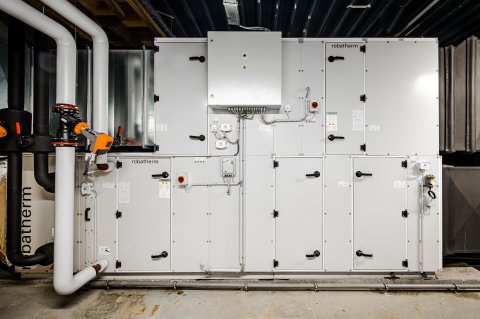What is Computer Aided Facility Management
Computer Aided Facility Management (CAFM) software enables facility managers to plan, execute, and monitor all activities involved in reactive and planned preventative maintenance, space and move management, asset management, operational facility services, room reservations and other customer services.
There is often confusion between CMMS and CAFM software, even though they serve very different purposes. CMMS (Computerised Maintenance Management System) software is mainly focused on preventive and corrective maintenance of technical equipment. CAFM software, on the other hand, covers a broader functional scope: space management, user services, working environment and occupant well-being.
Ultimately, information from computer aided facility management solutions allows managers to improve long-term planning of space, facilities, maintenance, services and budgets to ensure full alignment with core business needs.
CAFM and CAD – What you need to know
A picture is more valuable than a thousand words. Therefore, the best CAFM solutions integrate CAD drawings into various processes including space management, scenario planning, layout plans, flexible workplaces, moves, and technical management. All these processes contribute to the efficient use of space and facilities.
Industry standards
To ensure an efficient re-use of CAD drawings with CAFM software, drawings need to comply with conventions for layer structures, polylines, symbols, blocks, text, dimensioning etc. These can be your company standards or standards as set by bodies such as ISO, CEN or IFMA.
Compliance with these conventions and other CAFM best practices enables you to ease the process of connecting CAD drawings with your CAFM solution and consistently exchanging relevant data like spaces, dimensions, and assets.
Graphical and alphanumeric changes
CAD drawings are only valuable in CAFM if they are up-to-date. Updating CAD drawings is usually a specialised job in AutoCAD®, that involves moving walls, merging rooms and reassigning facilities or departments. These changes are done quickly and easily in a CAD drawing, but how do you ensure that this new information is updated in the CAFM database?
CAFM software handles such data exchange processes in different ways, either by periodically importing revised drawings or updating database information real time. This ensures a consistent connection and reliable integration between CAFM and CAD.
Scenario planning
A key strength of CAD software such as AutoCAD® is the ability to create multiple scenarios for processes including space planning, move management and asset management. When combining these scenarios with a Computer Aided Facility Management solution, you can report, compare, and analyse scenario’s to ensure the best option.
Once a scenario is selected, the CAFM system will automatically assure a consistent update of your database and support the scenario realisation with processes like project management, move management, work order control and budget management.
When combining CAFM and CAD, you can easily visualise real-time database information such as space usage, vacancies, and emergency escape routes using coloured mappings. This graphical visualisation is very supportive in the ‘where?’ questions such where departments are located, where assets are situated or where free space is available.
Modern CAFM solutions include so called ‘viewers’ to allow you to query CAD drawings without a need for specialised CAD software. Apps on mobile phones can also be used to query graphical information easily and search for free spaces, free workplaces or to simply find a colleague.
CAFM, IWMS or CPIP: big differences or marketing hype?
Computer Aided Facility Management software has undertaken major developments in both functionality and technology. Importantly, the integration of different Facility Management (FM) and Corporate Real Estate (CRE) processes within one single solution. Many organisations are still using point solutions or their in-house tools for specific processes, but there is a clear trend toward more integrated solutions.
Several software vendors label their CAFM system as IWMS (Integrated Workplace Management System) or CPIP (Connected Portfolio Inteligence Platforms), but what's the real difference in term of functionallity, technology, and value for your business?
Initially, CAFM systems were designed to handle specific facility management tasks, such as space planning, asset tracking, and maintenance management. These early systems focused on providing tools for recording and visualising data, often with a strong reliance on CAD for space management. By the late 1990s and early 2000s, as organisations sought greater efficiencies and comprehensive insights across multiple operational areas, CAFM systems began incorporating additional functionality to support broader business processes. Organisations wanted a unified solution that could integrate real estate management, maintenance, and capital project management rather than relying on separate systems for each.
In 2004, Gartner introduced the term Integrated Workplace Management System (IWMS) to reflect a whole new generation of unified software solutions. An IWMS was defined as an enterprise-class software platform that integrated key functions across five essential domains into a single technology platform with a centralised data repository. These five domains were:
- Real Estate and Lease Management: Manages the acquisition, ownership, and disposal of real estate assets, including lease administration and lease accounting.
- Facilities and Space Management: Oversees the operation and maintenance of buildings and infrastructure, including space planning, allocation, and utilisation.
- Asset & Maintenance Management: Tracks and manages physical assets, schedules maintenance, and optimises asset life cycles.
- Capital Project Management: Plans, executes, and monitors capital projects, such as construction, renovations, and expansions.
- Environmental Sustainability: Promotes eco-friendly practices, reduces environmental impact, and ensures compliance with sustainability regulations.
An IWMS thus differs significantly from a CAFM by offering a much broader range of features and capabilities. But as Gartner notices, perhaps the most important difference is that true IWMS solutions are based on one single technology platform and database repository. This sets it apart from being a collection of point solutions.
In the late 2010s, Connected Portfolio Intelligence Platforms (CPIP) emerged to represent the next evolution of CAFM/IWMS. CPIP solutions deliver enhanced customer value through insights derived from Internet of Things (IoT) and more advanced analytics. They integrate real-time data capture and advanced capabilities, such as predictive analytics and AI, to provide a more connected and intelligent offering.
Discover more about IWMS and CPIP, and find out if either solution meets your needs.
Comparing CAFM, CMMS, IWMS and CPIP
Are you still wondering what the main differences are between a CAFM, CMMS, IWMS, and CPIP? The table below highlights the main pros and cons of each solution.
| System |
Focus |
Pros |
Cons |
| CAFM |
Space management, maintenance scheduling, asset tracking and resource allocation |
Cost-effective for smaller organisations, quicker implementation, customisation options |
Narrow functionality scope, limited scalability, more operationally focused, less strategic |
| IWMS |
Space management, maintenance management, asset life cycle management, integrated services, energy and sustainability management, real estate management |
Integrates and centralises data from various sources, departments, and systems in real time, scalability, configurability, integrates strategic insights with operations |
May have longer implementation, extensive feature set may be overwhelming for organisations with limited requirements |
| CMMS |
Maintenance operations and equipment upkeep |
Streamlines maintenance processes and access to high quality data for decision making |
May have longer implementation, may require new process adoption |
| CPIP |
Real-time data integration, advanced analytics, IoT-enabled insights, and smart building management |
Provides enhanced customer value through IoT and analytics, supports smarter workflows and greater automation, modular and cloud-based for easy integration with third-party apps |
May require significant investment in IoT infrastructure, complexity in managing and integrating diverse data sources, potential need for specialised skills to leverage advanced analytics |
Basically, an IWMS is an enterprise system designed to support a wider set of functions for large complex organisations. In contrast, CAFM has a narrower focus for managing facilities and their physical spaces, primarily aimed at medium to small organisations. A CMMS supports maintenance operations and equipment upkeep. And CPIP systems encompass all these functionalities but require more time for complete integration.
The future of building management with CAFM, IoT and AI
The combination of computer-aided facility management (CAFM) with the Internet of Things (IoT) and Artificial Intelligence (AI) is turning conventional buildings into smart, efficient environments. This integration significantly enhances facility management by improving efficiency, sustainability, and cost-effectiveness.
Enhancing Sustainability and Cutting Costs
- Energy Optimisation: Real-time data from IoT devices and AI-driven analytics allows for precise control of energy systems. This reduces waste and helps buildings meet environmental standards and reporting requirements for issues such as ESG and achieving net-zero goals.
- Operational Efficiency: Automating routine tasks using CAFM and IoT technology reduces labour costs. Tasks like data collection, scheduling maintenance and updating space usage are managed automatically, allowing staff to focus on more critical issues.
- Cost Management: By analysing space utilisation data, facility managers can better understand how spaces are used. This insight allows for the optimisation of used versus underused areas, significantly impacting revenue, as many office spaces can be a drain on costs from unnecessary cooling, heating, and lighting of underutilised spaces.
Proactive Maintenance and Strategic Insights
- Predictive Maintenance: AI can analyse data from IoT devices to predict when equipment might fail, allowing for timely maintenance. This proactive approach reduces downtime by up to 50% and extends the life of equipment by up to 40%.
- Data-Driven Decision Making: AI provides valuable insights and identifies developing or unidentified ongoing trends that can help facility managers make informed resource management decisions and continuously improve facility operations.
Deciding what’s best for you
Are you reviewing which solution will best meet the needs of your organisation? Then contact us for a personalised demo to see how Planon can empower your facility teams to meet today’s real estate needs, as well as those of tomorrow.
Case study
One of Planon’s clients, the University of Sunderland, found its legacy CAFM system was no longer keeping up with needs and expectations, and decided to search for an IWMS instead to improve operations and reporting across multiple departments. It went live with Planon in just 7 weeks.
Frequently Asked Questions
Besides facility managers, CAFM software is also used by real estate professionals and maintenance teams to streamline facility operational processes and improve the management of asset, maintenance, and space records. CAFM solutions provide these users with a comprehensive view of all facility operations.
Information from CAFM solutions helps organisations manage their buildings and facilities more efficiently. This is how different professionals may use CAFM software:
Facility Managers
- Space Management. CAFM systems help optimise space utilisation by providing detailed insights into how space is used, identifying underutilised areas, and helping to identify potential reconfigurationsto maximise efficiency.
- Asset Management. They can keep track of all facility assets, ensuring they are properly maintained and utilised, and reducing the risk of loss or misplacement.
Real Estate Managers
- Lease Management. CAFM can manage lease agreements, track lease expirations, and ensure compliance with lease terms, helping avoid costly oversights.
- Portfolio Analysis. These systems offer comprehensive data analysis tools that enable managers to evaluate the performance of their real estate assets, make informed investment decisions, and identify opportunities for cost savings.
Maintenance Managers
- Preventive Maintenance. CAFM systems can schedule regular maintenance tasks, ensuring that all equipment is serviced on time and reducing the likelihood of unexpected breakdowns or regulatory non-compliance.
- Work Order Management. They streamline the creation, assignment, and tracking of work orders, ensuring that maintenance issues are addressed promptly and efficiently.
A professional may use Computer Aided Facilities Management (CAFM) solutions in the following ways:
- Space Management: Utilise CAFM for organising floor plans and allocating space efficiently to optimise space usage within facilities.
- Maintenance Management: Employ CAFM to schedule and track repairs and inspections systematically, ensuring timely maintenance of facilities and equipment.
- Asset Management: Utilise CAFM to make an inventory and monitor equipment and assets, facilitating effective asset management practices.
- Resource Scheduling: Use CAFM to book rooms, equipment, or services, streamlining resource scheduling processes and avoiding conflicts.
- Reporting and Analytics: Leverage CAFM's reporting and analytics capabilities to generate insights and track performance metrics, aiding in data-driven decision-making and continuous improvement efforts.
- Integrations: Integrate CAFM with other systems such as building automation or financial software, enabling seamless data exchange and enhancing overall operational efficiency.
- Mobile Accessibility: Access facility data on the go using CAFM's mobile accessibility features, empowering professionals to manage facilities remotely and stay informed even while away from the office.
Computer Aided Facility Management (CAFM) software offers a multitude of benefits for facility managers, empowering them to efficiently plan, execute, and monitor various activities related to space and workplace management, asset management, maintenance, operational services, room reservations, and customer service requests. Below are some of the key benefits:
- CAFM systems streamline operational monitoring of facility services such as cleaning, security, and catering, ensuring smooth and efficient service delivery.
- They automate routine data management tasks, freeing up time for staff to focus on more strategic activities.
- CAFM enables effective space planning and utilisation, and the optimisation of layouts to maximise efficiency and productivity.
- It facilitates easy monitoring and management of workplace environments, ensuring they meet the needs of occupants.
- CAFM systems offer comprehensive tools for making an inventory and monitoring assets, enabling efficient asset management practices.
- They provide insights into asset usage, maintenance requirements, and life-cycle management, helping optimise asset performance and longevity.
- With CAFM, maintenance tasks can be planned and scheduled in advance, reducing downtime and minimising the risk of unexpected equipment failures.
- It allows for the implementation of planned preventative maintenance programmes, prolonging the lifespan of assets and reducing repair costs.
- CAFM facilitates room reservations and resource scheduling, making it easy to book rooms, equipment, or services, and avoid scheduling conflicts.
- CAFM enables efficient handling of customer service requests, ensuring timely resolution and enhancing overall customer satisfaction.
- It provides transparency and accountability in addressing customer inquiries and issues.
- CAFM systems offer robust reporting and analytics capabilities, providing valuable insights into facility performance, usage trends, and resource allocation.
- They support data-driven decision-making, enabling managers to identify areas for improvement and implement strategic initiatives effectively.
Our global success stories








